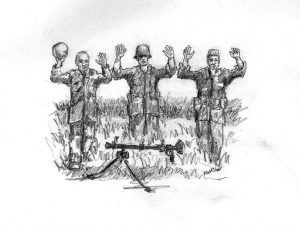Rebellion is part of growing up

It is normal that in our youth we rebel against the the structures which have been imposed on us by our parents and our immediate environment. It is part of the developmental process and it is necessary to begin our own personal journey of individuation. If this rebellion persists and reaches levels of real violence as opposed to the “normal” teenage hassles, we need to ask ourselves what the reasons are for it, especially when property and people are wilfully damaged.
The “fashion” of “fighting” against the “establishment” began in the late 60ies, at least in Germany, where I grew up. The demonstrations in Berlin ended in shootings, providing to the political left some hero for further use in their ideological war against the state and all people who were suspected of holding power. The radicals pretended to be cool and tough by shouting slogans, burning flags, sometimes cars, and by fighting with the police. But, then and now, are they really what they pretend to be?
The Story of my Ex – Fighting Against (what?)
In the early 70ies I was newly married to a young man who was lucky enough to already earn good money as an architect. But his head was still full of these strange ideas and beliefs which he had picked up in University: the need to “fight against the establishment” and for the “proletariat”. Being the son of medical doctors, he himself actually was part of the “establishment” that he pretended to be fighting against by – stealing! Stealing from the office, from restaurants and hotels and in bookshops – where he finally was caught by the police. You should have seen this “righteous” man when he came home and confessed what had happened. No hero anymore fighting for the oppressed, but trembling with fear of being punished and of his future career being impacted by being sentenced.

Nobody was really damaged greatly by his deeds, it was first of all the ethical component in his thoughts and behavior. My warnings had been dismissed for years that stealing was just not right, even when a bookshop has an owner who earns some money by selling books, or even when a boss gets more money than a young employee. His black-and-white thoughts created his arguments to justify his own misbehavior and he extracted a strange “right” out of the income-difference – and “Class difference”, of course, – to damage others. It even seemed to be his duty to do so, in order to “help the lower classes”, the same shallow arguments which we hear today, again. Well, no, these were only rationalisations for a game which he should have played in earlier times, as a boy at home, but not as an adult in society.
Why do people adhere to fascinating, but wrong ideas?
So what makes people believe such weird things and act with extreme radicalism against property and people without any sign of recognition that what they are doing is WRONG, unless they are caught and convicted, and maybe not even then? They are not at all interested in helping the people which they pretend to fight for. They are acting out – dangerously – what they have missed in their own childhood and youth.
Very interesting in this regard is the conversation of Stefan Molyneux with an ex-Antifa fighter who openly talks about his story, his upbringing, his attraction to the radical left. He describes the culture and the actions there and his long journey to arrive to the understanding that they were, by no means, justified and “right” as he had been willing to believe before, and for so many years.
Boys Need Fathers
Boys need the guidance of men when they grow up. Boys coming from families without fathers or with dysfunctional fathers are much more likely to become extremist “heroes” than those who had fathers to teach them to be men.

The liberation of women – which I really appreciate – and the subsidies of the state for single moms have created a situation where many women prefer to raise their children without their fathers. And that is a bad idea, at least as regards the psychological health of the children, males and females alike. I don’t say that a woman needs to stick with the father of her children no matter what, as it was for such a long time. What I DO say is that – understandably – women in their new freedom exaggerate in egocentrism and don’t properly consider the psychological needs of their children. They actually continue adhering to the very traditional belief that only the material needs are important to be met in a child’s life – while they are thinking to be very progressive and evolved. Not reall
The Fatherless Generations

Coming back to my ex-husband. He was born in the first years of WWII, no fathers around and the mothers busy finding ways to survive. His father came home from war, but probably, as all people of that generation, unable to elaborate his own tragic experience. So the physical presence of a father in the house was not a guarantee for the children to have a “father” who would play the role they needed for their healthy development. A whole generation grew up fatherless and so they didn’t learn what is “right and wrong” in life, the classical role of fathers. Children need to know where the boundaries are. When they haven’t learned that when young they have a lot of problems in adult life which we could roughly describe as either depression or aggressivity and violence.
What Steve Reports About Antifa
That’s what connects the stealing of my ex-husband with the Antifa terrorists and the Social Justice Warriors: they have never learned to find their rightful place in society and they are full of illusions about themselves, the world and their power to do whatever they want to do.

In terms of “Integral Theory” or “Spiral Dynamics”: they are stuck in the “red” egocentric warrior stage. They haven’t learned to adapt to society – which is a necessary stage in the growing-up process – and so they never could transcend it and grow out of it into a person who has integrated the rules, without being any longer totally conditioned by them. In other words: they never have grown into a true rational stage where they would be able to properly decide what to do and what not. Instead they use rational language to justify their irrational behavior. This phenomenon is called “rationalization”. It means roughly that: you find a string of arguments after the fact to make your actions appear “right”, but you didn’t think your behavior thoroughly through before you acted it out.
Missing or unhealthy stages in personal development: the reason for disaster.
If it is the ultra right or the ultra left or any other group ready to use violence against objects, animals and people, they basically are children in their psychological development and their belonging to the group gives them what they lacked otherwise. They do everything to belong and to be valued in that group, hence the absurd violence in speech and action of the individuals. Their behavior is the response to what they didn’t get in childhood: belonging and recognition as a human being. It is as easy as that to understand, but surely not to handle and heal.
True Rationality Allows Freedom of Choice

For those who actually have succeeded in arriving at the rational stage of their personal development, like the guy named Steve in the above interview, it is possible to understand what is going wrong in the group and to find a way out. This certainly is very difficult and often dangerous because fundamentalist radicals don’t joke and bully and damage those whom they label “traitors°. History is full of evidence of that.
Congrats to Steve that he managed to get out of the group prison and to spread the word and inspire others to follow his steps – for their own personal good and for that of our society which has enough trouble with many other things apart from crazy dangerous never grown up children.
PS.In a future post I will try to outline the difference between men and women in their path to radicalism. The lack of the father seems to be more important in the boy’s socialisation, while women have still other dragons to slay.
Very interesting points you’ve made here. I’m definitely looking forward to reading your future post regarding the differences between women and men where this is concerned.
I’ve been chewing over your statement, “The liberation of women – which I really appreciate – and the subsidies of the state for single moms have created a situation where many women prefer to raise their children without their fathers. And that is a bad idea, at least as regards the psychological health of the children, males and females alike.”
Then I read on to, “Children need to know where the boundaries are. When they haven’t learned that when young they have a lot of problems in adult life which we could roughly describe as either depression or aggressivity and violence.” Although I completely agree with this statement, I do think a woman can accomplish setting boundaries and child rearing without a man, and end up with a stable and functional healthy young adult.
When you talk about fathers, are you specifically speaking of blood-relation, the biological father of the child should be in the home and/or an active role in the child’s life? (Obviously this would be ideal) Or, are you simply saying children (boys in particular) need a male role model in the stead of a father to teach them that which a father would have, in the ideal and traditional family household?
I really enjoyed reading this and learning your take on these issues, it’s a little bit of a different perception and I always enjoy hearing someone else’s viewpoints. Thanks for this!
Thanks Courtney, for your long comment. I really appreciate that we enter in conversation here. I do understand that you have a different perception, this is alright. I had different ideas for a long time in my life, I thought that we women are sort of 2nd class people in our society and that we need to fight for being like men. It took me a very long time to understand that we need to address the women-men discussion from a different level. Neither women wanting to become men (in their ways of being and approaching the world), nor fighting against men as the “source of the evil patriarchy” – what is still a quite fashionable attitude.
We, women and men, first of all have to grow up internally and then address what is needed to be changed. Victimism is not a good starting point.
Regarding the father for boys. I do think that blood ties are not necessary as long as the father figure is really caring about the boy and his growing into a man. Women can surely set boundaries, too, but when growing up only with one parent, children always lack the other energy. And this is difficult to repair later on, unfortunately. The basic setup in children happens until they are four, and in the important period in puberty it is better to have both perspectives to support the young people for a balanced perspective on life.
Your post did strike a chord with me since I am contemplating about similar topics for a long time.
I do a agree with your statements on many areas and I can see the point you have made about your own generation being the one growing up “fatherless”. I can see what you mean since my father too went to war in WWII and also had been a POW for 4 years in the U.K. before coming home.
In today’s day and age and I should add digital before it, kids still grow up fatherless since I personally do believe many young fathers are just not ready to fill this so important role.
I see it in my own family how the parent, both actually, are more in the role of an older sibling than the actual role of a parent.
Language, behavioral patterns against others are taught on a buddy-buddy level rather than being the parent who guides the child into the right/better direction.
In my family, these “structures” have already shown some backfiring on the oldest grandchild, 16 years old, who can’t settle into any part-time job (already on his 4th job in less than 5 months) because he can’t take “orders” etc. from anyone.
Well, I could talk more but this too would be a much too long post.
I do appreciate your dedication to this topic and you also have given me more food for thoughts. 🙂
Sylvia, thanks for your thoughtful comment. Yes, I believe that it is still hard for men to take care for their kids in the way which would be more beneficial to their growing into responsible adults – which they, themselves, probably are not, or not yet. Women just have another need or push to become responsible as soon as children are born. Some don’t, but this is certainly the exception.
As to the education modalities. We had this idea of “anti-authoritarian education” which basically was dealt with as “let them do what they want to do” and which didn’t take into account the research result of developmental psychology at all. Much to the detriment of the young people. I am sorry to hear about the difficulties which your grandson already is facing. I do hope that you and his parents will find a way to repair a little and help to get him interested in something with with which he can stick and learn how to keep commitments and how to go on in life. Otherwise he would be an easy pray of those ideologic movements which, then, totally destroy his life (as mentioned in the article) – or make it much more difficult to sort himself out.
Btw. There is a program which helps a lot young people to “sort themselves out”, the “Self Authoring Program” by Jordan B. Peterson, a clinical psychologist whom I am following for a while now and who has taught me a lot about us humans and how we can live a better life.
What an interesting article, it made me immediately think about the current day generation of children who lack the discipline required to teach them about boundaries.
In today’s society there is a group of people who are totally against what they call violence, what I call discipline and in other words, when a child requires a “smack” they should get one, not a “belting” or “spanking” as these words instill the term: violence.
Your comments on boys requiring a “father figure” is spot on, even in today’s society, and obviously in the era that you are discussing, because setting boundaries helps people to learn how to fit into society.
However, it also provides the children with recognition and belonging, the knowledge that someone cares for them enough to be firm and consistent in their upbringing.
Your comment: “Their behavior is the response to what they didn’t get in childhood: belonging and recognition as a human being. It is as easy as that to understand, but surely not to handle and heal.” stuck in my mind as I was reading through your comments.
It is this belonging and recognition as a human being that helps children forge their way in life as they become young adults.
Hi Steve and thanks for your engaging comment here. We are living in crazy times where the right measurement is totally lacking, where some people don’t admit a difference between, lets say, Mother Teresa and Hitler, as they can see violence everywhere where it is not – and ignore it where it is. I am thinking here about the “social justice warriors” who claim to be compassionate (with the people of their choice – if they are) and at the same time highly violent against the rest of the people (like “white males”) by accusing them of violence. They are those who never have learned to have boundaries and therefore have no idea when they invade others, those who they think they help with their violent behavior and those who are their declared enemies.
Education in the past 60 or so years was an experiment which clearly failed. Now we have to correct it somehow – without going back to unhealthy educational methods of physical or psychological violence which was characteristic for our western societies until, lets say, the 60ies.
Thanks for your thoughts and if you want to share more of your insights, please do so!
PS. We have live broadcasts on https://thewisdomfactory.net. Check out if you find something which is interesting for you and be our appreciate audience member!
Hi Heidi,
Thanks for the good read. You make some interesting points and I tend to agree with you on most of it. I still find it a bit odd why some people feel the need to rebel especially if there is no purpose behind it.
I have noticed this in the UK with some of my friends who are going down this road albeit to a lesser extent. It’s like they are forming their own community of rebels.
Do you think it makes them feel better if their friends do it too? I don’t know, sometimes I think it’s insecurity.
Hi Craig, yes, I do think that these phenomena are very much connected with the peer group and the desire to belong. If the group takes an unfortunate route because of some leading element then people (especially young people) often stay for fear to be alone and maybe even harassed when they leave. I believe that many exhibit destructive behavior in a group while they wouldn’t do similar things on their own. “Group mind” is very powerful, for the bad, but also for the good.